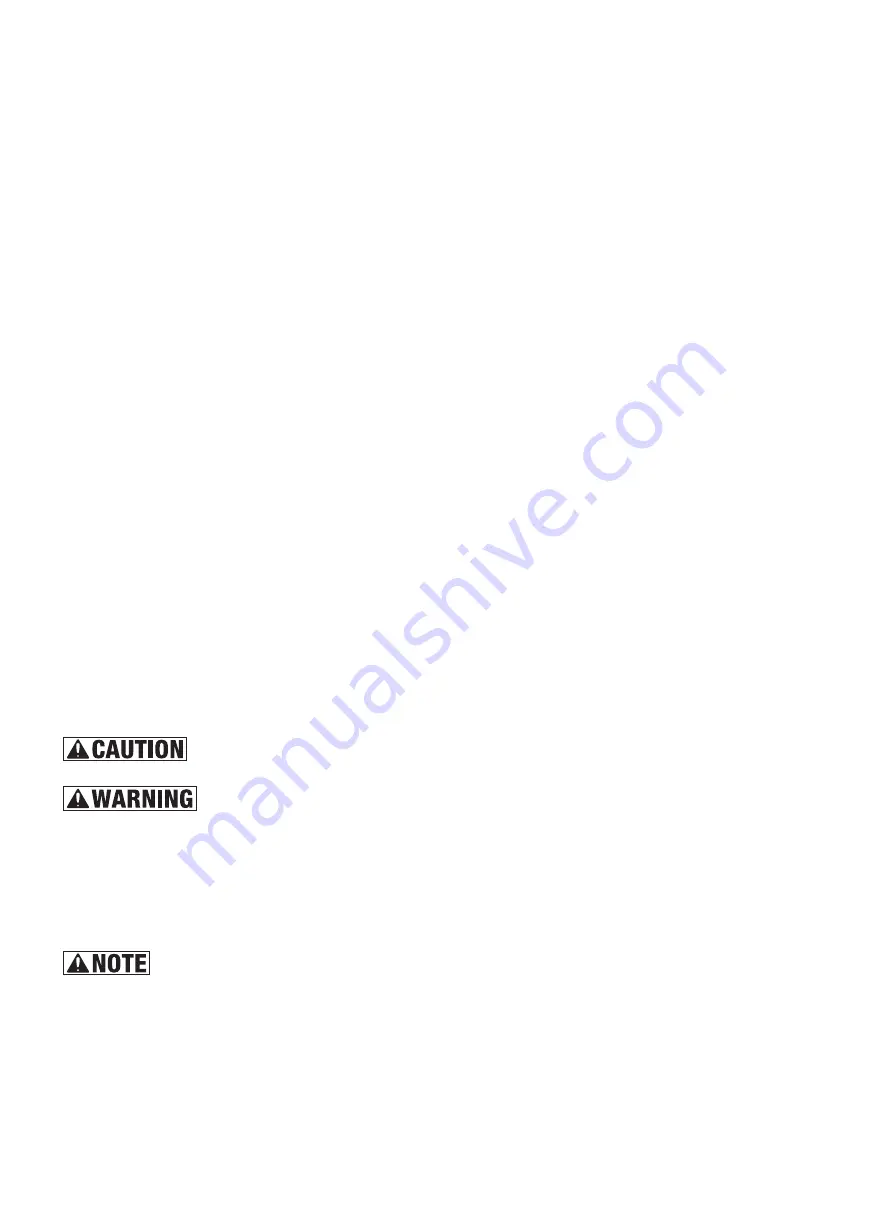
OPERATION
1. Read the Operator’s Manual completely before attempting to use this log splitter.
2. Do not allow anyone to operate your log splitter who has not read the Operator’s Manual or has not been instructed on the
safe use of the log splitter.
3. Never allow children or untrained adults to operate this machine.
4. Never leave the machine unattended with the engine running.
5. Never operate the machine when under the influence of alcohol, drugs or medication
6. Many accidents occur when more than one (1) person operates the log splitter. If a helper is assisting in loading logs to be
split, never actuate controls until helper is clear of the area.
7. Never allow anyone to ride on the machine during use or during operation.
8. Never transport cargo on the log splitter.
9. Always operate the log splitter with all safety equipment in place and all controls properly adjusted for safe operation.
10. High fluid pressures are contained in hydraulic log splitters.
Pressurized hydraulic fluid escaping through a pin hole opening can puncture skin and cause sever bleeding and result in
blood poisoning. Therefore, the following instructions should be heeded at all times.
– Be sure to confirm all hose connections and hose clamps are tight before each use. It is possible for connections to
vibrate loose over time
– Do not operate the unit with frayed, kinked, cracked or damaged hoses, fittings, or tubing.
– Stop the engine and relieve hydraulic system pressure before changing or adjusting fittings, hoses, tubing, or other
system components.
– Do not adjust the pressure settings of the pump or valve. The factory presets are tested for optimal system performance.
Tampering with or modifying these settings will render your product warranty nu,, and void.
– Do not check for leaks with your hand. Leaks can be detected by passing cardboard or wood over the suspected area.
Look for discoloration. If injured by escaping fluid, see a doctor at once. Serious infection or allergic reaction can develop
if proper medical treatment is not administered immediately.
11. Keep the operation zone and adjacent area clear for safe, secure footing.
12. Always keep hands and feet clear of moving parts.
13. If your log splitter is equipped with an internal-combustion engine and intended for use near any unimproved forest, brush,
or grass covered land, the engine exhaust should be equipped with a spark arrestor. Make sure you comply with local,
state, and federal codes. Take appropriate fire-fighting equipment with you.
14. Log splitters should be used only for splitting wood. Do not use for other purposes unless the manufacturer provides
attachments and instructions for such purposes.
15. When loading a ram-type log splitter, place your hands on the sides of the log, not the ends. Never place your hands or any
part of your body between a log and any part of the log splitter
16. Only split wood WITH the grain.
NEVER
split perpendicular to the grain.
17. On ram-type log splitters, never attempt to split more than one log at a time unless the ram has been fully retracted and a
second log is needed to complete the splitting of the first log.
18. On ram-type log splitters when the logs are not squared, the longest portion of the log should be rotated down and the
most squared end placed against the ram.
19. Use only your hand to operate the log splitter controls, never kick the handle with your feet.
20. Do not refuel the engine until it has cooled for several minutes.
* Please read Alphaworks "Gasoline Engine Manual" for engine operation requirements and precautions.
Add Hydraulic Oil
DO NOT
remove the hydraulic oil fill cap when the engine is running or hot. Hot oil can escape causing severe burns.
Always allow the log splitter to cool completely before removing the hydraulic oil cap.
High fluid pressure and temperatures are created in the hydraulic log splitters. Hydraulic fluid will escape through a pin-size
hole opening and can puncture skin.
Inspect hydraulic system regularly for possible leaks.
Never check for leaks with your hand while the system is pressurized.
Seek medical attention immediately if injured by escaping fluid.
To check hydraulic oil level, insert the dipstick into fill neck until it stops.
Remove and read level. Do not thread dipstick into fill neck when checking oil.
When the outdoor temperature is below 32°F , Dexron III transmission fluid can be used.
1. Make sure the log splitter is on a flat, level surface.
2. Remove the dipstick from the oil tank.
3. Add 1.6gallon of hydraulic oil - AW32 / AW46
4. Check hydraulic oil level with oil dipstick. The oil level should be on the dipstick.
5. Tighten the dipstick.
6. Start engine (see Starting the Engine in the Operation section).
7. Extend and retract the cylinder to purge air from the hydraulic system. Cylinder motion should be smooth and continuous.
10






























